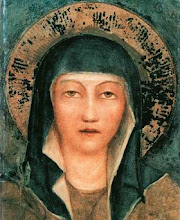Chiara Countdown: John Paul II's Homily on St. Clare

The following is taken from the Poor Clare’s website at www.poor-clares.org and features the late Pope John Paul II’s homily, which was given on the Feast of St. Clare, 1993:
Eight hundred years ago, Clare of Assisi was born to the nobleman, Favarone di Offreduccio. This "new woman," as the Ministers General of the Franciscan families wrote of her in a recent letter, lived as a "little plant, in the shadow of St. Francis, who led her to the heights of Christian perfection. The celebration of such a truly evangelical creature is meant most of all to be an invitation to rediscover contemplation, that spiritual journey which only the mystics experience deeply. To read her ancient biography and her writings -- the "Form of Life, her Testament, and the four extant letters of the many she wrote to St. Agnes of Prague -- means being so immersed in the mystery of the triune God and of Christ, the Incarnate Word, as to be dazzled. Her writings are so marked by the love stirred up in her by her loving, prolonged gazing upon Christ the Lord that it is not easy to express what only a woman's heart could experience.
Clare's contemplative journey, which will culminate in her vision of the "King of glory", begins precisely in her total abandonment to the Spirit of the Lord, in the same way as Mary did at the annunciation: that is to say, it begins with that spirit of poverty (cf. Luke 1:48) which empties her of everything but the simplicity of a gaze fixed on God.
For Clare, poverty -- which she loved so much and mentioned so often in her writings -- is the wealth of the soul which, stripped of its own goods, is open to the "Spirit of the Lord and his holy manner of working", like an empty shell in which God can pour an abundance of his gifts. The Mary-Clare parallel appears in St. Francis' earliest writing, in the Forma Vivendi he gave to Clare: "By divine inspiration you have made yourselves daughters and servants of the Most High King, the heavenly Father, and have taken the Holy Spirit as your spouse, choosing to live according to the perfection of the holy Gospel."
Clare and her sisters are called "spouses of the Holy Spirit - an expression not common in the Church's history, in which a sister, a nun, is always described as the "spouse of Christ." Here we have the resonance of some expressions from Luke's account of the annunciation (cf. Luke 1: 26-38), which become key words for expressing Clare's experience: the "Most High, the Holy Spirit," the "Son of God," the "handmaid of the Lord" and, lastly, that "over-shadowing" which for Clare is her investiture, when her hair was shorn and fell at the foot of our Lady's altar in the Portiuncula...
If Catherine of Siena is the saint full of passion for the Blood of Christ, the great St. Teresa is the woman who goes from "mansion" to "mansion" to the threshold of the great King in the interior castle and Therese of the Child Jesus is the one who, in Gospel simplicity, travels the little way, Clare is the passionate lover of the Crucified Christ, with whom she wants to identify absolutely...
Clare and her sisters had hearts as large as the world: as contemplatives, they interceded for the whole of humanity. Those souls, so sensitive to the daily problems of each person, were able to take all difficulties upon themselves; there was no concern, suffering, anguish or discouragement of others which did not find an echo in the hearts of these prayerful women...
In reality, Clare's whole life was a Eucharist because, like Francis, from her cloister she raised up a continual "thanksgiving" to God in her prayer, praise, supplication, intercession, weeping, offering and sacrifice. She accepted everything and offered it to the Other in union with the infinite "thanks" of the only-begotten Son, the Child, the Crucified, the risen One, who lives at the right hand of the Father.
During this jubilee year, dear sisters, the whole Church's attention is turned with growing interest to the shining figure of your beloved mother. With how much greater fervor should you look to her in order to draw encouragement from her example and intensify your effort to respond to the Lord's grace with daily dedication and that commitment to the contemplative life from which the Church draws so much strength for her missionary activity in today's world!
May Christ, our Lord, be your light and the joy of your hearts. With these wishes, as a sign of my deep affection, I impart a special Apostolic Blessing to all. From the Vatican, 11 August, the liturgical memorial of St. Clare of Assisi, in the year 1993, the fifteenth of my Pontificate.
JOANNES PAULUS PP. II









1 Comments:
One thing is clear: Francis and Clare demolished the myth that loving God and loving another are mutually exclusive.
Post a Comment
<< Home